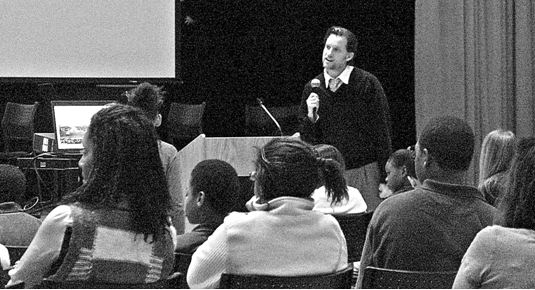On Friday, November 16, I had the opportunity to go and talk to the students of
Troup
Middle School
about their school’s namesake, Augusta Lewis Troup. I spoke in the auditorium twice, once each to lower and upper grade students, with the help of a PowerPoint presentation. Our President, Bill Berndtson, came as well and assisted me with both technological and historical knowledge.
 TROY RONDINONE SPEAKS TO AN ASSEMBLY AT
TROY RONDINONE SPEAKS TO AN ASSEMBLY AT
TROUP
MIDDLE SCHOOL
ABOUT THE SCHOOL’S NAMESAKE, AUGUSTA LEWIS TROUP (Bill Berndtson photograph; with thanks to Virginia Blaisdell for image editing and photo color conversion)
I found that the students were excited to learn about the labor pioneer who, at age twenty, formed a Women’s Typographical Union and helped change the way that workers organized themselves according to gender. I showed them images of Troup’s past, as well as close-ups of the mural at their school. They were interested in Troup’s legacy and in the labor history of their city.
This assembly was part of a broader objective of our organization, that being to get labor history into the schools.
Students, while in general woefully unaware of our country’s past, are especially in the dark in regards to labor’s role in shaping our laws and institutions. Students might know about the Civil Rights movement, for instance, but do they know that Martin Luther King, Jr. was assassinated while supporting a massive sanitation workers strike in
Memphis
? They might know that American colonists raged against “taxation without representation,” but do they know that the folks who dumped tea into
Boston
Harbor
in 1773 were mainly working-class folks, who raged at an insidious global corporation? Do students know that Abraham Lincoln thought labor should be viewed as superior to capital? Do they know that World War II inspired a massive strike wave aimed at bringing about “an industrial democracy”?
This “hidden” history is all the more important because organized labor is under attack, its contributions untaught. Students today might think that overtime pay was just a gift of benevolent bosses, or that workplace safety was created just because it was the right thing to do. Without labor agitation, much of what we call “progress” in
America
simply wouldn’t exist. Bringing a little labor history to
Troup
Middle School
is a nice start, but of course it is not nearly enough. It was a pleasure to talk about workers at Troup. Now it’s time to get labor history into the curriculum.